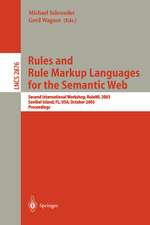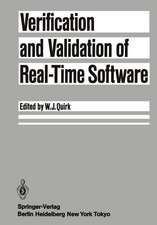Foundations of Knowledge Systems: with Applications to Databases and Agents: Advances in Database Systems, cartea 13
Autor Gerd Wagneren Limba Engleză Hardback – 31 iul 1998
In order to design and understand database and knowledge-based applications it is important to build upon well-established conceptual and mathematical foundations. What are the principles behind database and knowledge systems? What are their major components? Which are the important cases of knowledge systems? What are their limitations? Addressing these questions, and discussing the fundamental issues of information update, knowledge assimilation, integrity maintenance, and inference-based query answering, is the purpose of this book.
Foundations of Databases and Knowledge Systems covers both basic and advanced topics. It may be used as the textbook of a course offering a broad introduction to databases and knowledge bases, or it may be used as an additional textbook in a course on databases or Artificial Intelligence. Professionals and researchers interested in learning about new developments will benefit from the encyclopedic character of the book, which provides organized access to many advanced concepts in the theory of databases and knowledge bases.
| Toate formatele și edițiile | Preț | Express |
|---|---|---|
| Paperback (1) | 988.81 lei 6-8 săpt. | |
| Springer Us – 29 oct 2012 | 988.81 lei 6-8 săpt. | |
| Hardback (1) | 995.09 lei 6-8 săpt. | |
| Springer Us – 31 iul 1998 | 995.09 lei 6-8 săpt. |
Din seria Advances in Database Systems
- 20%
 Preț: 994.08 lei
Preț: 994.08 lei - 20%
 Preț: 986.66 lei
Preț: 986.66 lei - 20%
 Preț: 1269.78 lei
Preț: 1269.78 lei - 20%
 Preț: 986.99 lei
Preț: 986.99 lei - 20%
 Preț: 984.04 lei
Preț: 984.04 lei - 18%
 Preț: 947.98 lei
Preț: 947.98 lei - 20%
 Preț: 990.62 lei
Preț: 990.62 lei - 20%
 Preț: 985.68 lei
Preț: 985.68 lei - 20%
 Preț: 1279.71 lei
Preț: 1279.71 lei - 20%
 Preț: 997.25 lei
Preț: 997.25 lei - 20%
 Preț: 981.57 lei
Preț: 981.57 lei - 20%
 Preț: 644.98 lei
Preț: 644.98 lei - 20%
 Preț: 984.70 lei
Preț: 984.70 lei - 20%
 Preț: 981.06 lei
Preț: 981.06 lei - 20%
 Preț: 980.07 lei
Preț: 980.07 lei - 20%
 Preț: 1260.69 lei
Preț: 1260.69 lei - 20%
 Preț: 994.08 lei
Preț: 994.08 lei - 20%
 Preț: 991.14 lei
Preț: 991.14 lei - 20%
 Preț: 1282.83 lei
Preț: 1282.83 lei - 20%
 Preț: 649.09 lei
Preț: 649.09 lei - 20%
 Preț: 646.30 lei
Preț: 646.30 lei - 20%
 Preț: 649.60 lei
Preț: 649.60 lei - 18%
 Preț: 943.25 lei
Preț: 943.25 lei - 20%
 Preț: 646.30 lei
Preț: 646.30 lei - 20%
 Preț: 993.24 lei
Preț: 993.24 lei
Preț: 995.09 lei
Preț vechi: 1243.86 lei
-20% Nou
Puncte Express: 1493
Preț estimativ în valută:
190.47€ • 206.96$ • 160.10£
190.47€ • 206.96$ • 160.10£
Carte tipărită la comandă
Livrare economică 22 aprilie-06 mai
Preluare comenzi: 021 569.72.76
Specificații
ISBN-13: 9780792382126
ISBN-10: 0792382129
Pagini: 296
Ilustrații: XXIX, 296 p.
Dimensiuni: 155 x 235 x 19 mm
Greutate: 0.64 kg
Ediția:1998
Editura: Springer Us
Colecția Springer
Seria Advances in Database Systems
Locul publicării:New York, NY, United States
ISBN-10: 0792382129
Pagini: 296
Ilustrații: XXIX, 296 p.
Dimensiuni: 155 x 235 x 19 mm
Greutate: 0.64 kg
Ediția:1998
Editura: Springer Us
Colecția Springer
Seria Advances in Database Systems
Locul publicării:New York, NY, United States
Public țintă
ResearchCuprins
1. Conceptual Modeling of Knowledge Bases.- 2. Relational Databases.- 3. Object-Relational Databases.- 4. Reaction Rules.- 5. Deduction Rules.- 6. Principles of Positive Knowledge Systems.- 7. Temporal Databases.- 8. Fuzzy Databases.- 9. Further Examples of Positive Knowledge Systems.- 10. Principles of Non-Positive Knowledge Systems.- 11. Relational Factbases.- 12. Possibilistic Databases.- 13. Further Examples of Non-Positive Knowledge Systems.- 14. Communication and Cooperation.- 15. Deductive Knowledge Systems.- 16. Advanced Knowledge and Reasoning Services.- Appendices.- A— Partial Logics with Two Kinds of Negation.- A.1 Preliminaries.- A.2 Partial Models.- A.3 Classical Logic as a Special Case of Partial Logic.- A.3.1 From Partial to Classical Logic.- A.3.2 Confusing Semi-Partial Logic with Classical Logic.- B— Compositional Possibilistic Logic.- B.1 Introduction.- B.2 Preliminaries.- B.3 The Logical Semantics Problem of Reasoning with Uncertainty.- B.3.1 A Natural Solution.- B.3.2 The Non-Compositional Possibility-Theoretic Approach.- B.4 Semi-Possibilistic Logic.- B.5 Compositional Possibilistic Logic.- C— On the Logic of Temporally Qualified Information.- C.1 Syntax.- C.2 Semantics.- C.3 From Timepoints to Timestamps and Vice Versa.- C.4 Minimal Models.- References.
Recenzii
`...recommend the book to all people from database and knowledge communities who want to move their research and practice to more advanced innovative systems.'
Zentralblatt MATH, 910 (1999)
Zentralblatt MATH, 910 (1999)





















